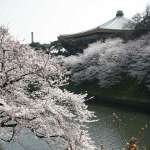Vernal Equinox Day in Japan Date in the current year: March 20, 2026
 Vernal equinox is generally associated with the arrival of spring. In some cultures, there are festivals related to this astronomical event, for example, Nowruz. In Japan, Vernal Equinox Day has been an official public holiday since 1948.
Vernal equinox is generally associated with the arrival of spring. In some cultures, there are festivals related to this astronomical event, for example, Nowruz. In Japan, Vernal Equinox Day has been an official public holiday since 1948.The roots of Vernal Equinox Day in Japan can be traced to kōreisai, Shinto days of worship intended to pay respects to the past emperors and members of the imperial family. They were established in 1878 and occurred on the spring and autumn equinoxes.
After the end of World War II, the Japanese government began to repackage Shinto observances as secular holidays in order to separate religion from the state, as provided by the 1947 Constitution of Japan. The separation of religion and the state in post-war Japan was one of the Allies’ demands. Soon after Japan’s capitulation in 1945, General Douglas MacArthur introduced the so-called Shinto Directive intended to separate all government ties to the control of religious activities. According to the Directive, public shrines were to remain available to everyone, but they would be supported privately.
Following the adoption of the new constitution, all observances related to Shintoism were transformed into non-religious holidays. Spring kōreisai (Shunki kōrei-sai) and autumn kōreisai (Shūki kōrei-sai) were replaced with Vernal Equinox Day and Autumnal Equinox Day, accordingly. Both are public holidays in present-day Japan.
Vernal Equinox Day (Shunbun no Hi) is part of a seven-day spring festival called Haru no Higan. Interestingly, Higan is not a Shinto custom, but a Buddhist one. It is believed to have originated in the 8th century. The tradition extends from mild weather that usually occurs around equinoxes. During this period, people who normally worked in the fields had more time to rest from work, evaluate their spiritual life, and to renew their efforts to follow Buddhism properly. Today, Haru no Higan is marked with special services observed in Buddhist temples throughout Japan.
The date of Vernal Equinox Day is not fixed because the spring equinox may occur on different dates. On the Gregorian calendar, it can occur as early as March 19 or as late as March 21. In addition, the date of the March equinox depends on the time zone. In Japan, the date of the spring equinox is calculated based on Japan Standard Time (JST). The date of Vernal Equinox Day is usually officially declared in February of the previous year.
Back in ancient times, the day of the vernal equinox was a time to visit the graves of one’s ancestors and pay homage to them. Today, the majority of Japanese see it as an additional day off work that they can spend with their families. Some people still visit the grave sites of their relatives and loved ones to clean them and leave offerings of flowers and symbolic food. Afterwards, they return home to celebrate with their families.
Since the vernal equinox is associated with the change of seasons and renewal, many people see it as a time to renew their lives. They thoroughly clean their homes and make life changes and resolutions.
- Category
- Public Holidays, Cultural Observances
- Country
- Japan
- Tags
- spring equinox, vernal equinox day, holidays in japan, shunbun no hi, public holiday